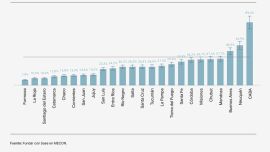In 2020, Argentina decided to tackle the Covid-19 pandemic with a harsh and long lockdown in a bid to protect its health system. But now, faced with a deadly second wave, the fragility of nation’s economy makes it difficult to apply similar drastic measures to those incorporated last year.
With a steep upward curve of infections in the last two weeks – which puts Argentina firmly in the top 10 countries with the highest number of new daily infections – the government of President Alberto Fernández imposed new restrictions as of midnight last Thursday.
The main measure is a night-time curfew, which many specialists consider will be insufficient in stopping the spread of the disease.
"The measures are very light. We are in the second wave and we have to take deeper measures in pursuit of health. I understand the pressure on the economy and that its engine is work, but that causes infections to increase," Alicia Cámara, an expert in coronavirus at the University of Córdoba, said in an interview.
The use of public transportation will also be restricted to essential workers, meetings will be limited, and nightclubs, party halls and gaming venues will be closed.
Fernández – who is in isolation with Covid-19, despite having been vaccinated with two doses of Russia’s Sputnik V jab – decided to introduce aid and subsidies to companies and workers last year to offset the impact of the lockdown.
"Luckily I did. I think we saved tens of thousands of lives," says the president.
However, these subsidies are, for the moment, not to be repeated. Citizens in Argentina are suffering – already in its third year of recession, the economy contracted 9.9 percent in 2020, one of the worst declines in the region.
In addition, the government faces crucial midterm elections in October, with the ruling Frente de Todos coalition searching to retain its majority in Congress.
"The government did not budget for social assistance this year, as it did last year. The government is trying to be prudent with restrictions because the economy has an impact on the voters’ decisions and the government needs a decent election that gives it legitimacy for the the next two years" in office, political analyst Carlos Fara told AFP.
‘Reluctant to stay at home’
The dilemma, between prioritising the economy or a nation’s healthcare system, remains unanswered.
According to Fernández, "it is very difficult for governments to impose greater restrictions because people do not comply with them. People are very reluctant to stay at home again – there are many people who need to go back to work. It is very difficult to contain them."
The size of Argentina’s black economy is a major problem in this regard. Poverty now reaches 42 percent of the population and unemployment rose to 11 percent at the end of 2020.
Underlining the discontent, hundreds of members of social organisations demonstrated in front of the Social Development Ministry on Thursday to demand more aid.
"We are asking for an increase [in assistance]. We are essential, we are the ones who are experiencing this pandemic in neighbourhoods, feeding the neighbors who are left without work," Nahuel Orellana, one of the protesters, told AFP.
For the majority of the population, their main concern is getting by, from day to day. "In focus groups, it can be seen that the pandemic concerns us as far as it affects the economic issue," said Fara.
However, experts take it for granted that it will be necessary to apply more stricter closures, as has happened in Europe and in Latin American countries such as Chile, especially as Argentina’s vaccination programme is advancing slowly.
‘Initial measures’
"The measures are going in the right direction. They mark a beginning, just a beginning. In the coming days the number of cases will continue to increase and the situation will get complicated," considers Jorge Geffner, an immunologist with the National Scientific and Technical Research Council (CONICET).
"It is proposed that in many regions of the country, particularly in the metropolitan area of Buenos Aires (AMBA), this is a first step and we have to advance with other measures," he added.
According to the expert, "if the cases evolve and we are not talking about 20,000 new cases but 30,000 new cases a day, it is clear that these measures will mean the first step and will have to be further restricted."
On Friday, Argentina registered a new record daily high of 24,130 infections in 24 hours. Over the last five days, the country has registered more than 104,000 cases.
In total, more than 2.4 million confirmed cases and 57,000 deaths have been recorded since last March.
Although in recent days the rate of vaccination has accelerated, as of this Thursday only 4,771,214 people – just over 10 percent of the population – have received a first dose.
"Vaccines are not arriving at the expected speed and immunisation is going to take a while longer. As much as we are fed up with the pandemic, the pandemic has not yet passed," said Cámara.
– TIMES/AFP [with reporting by Nina Negrón]

























Comments